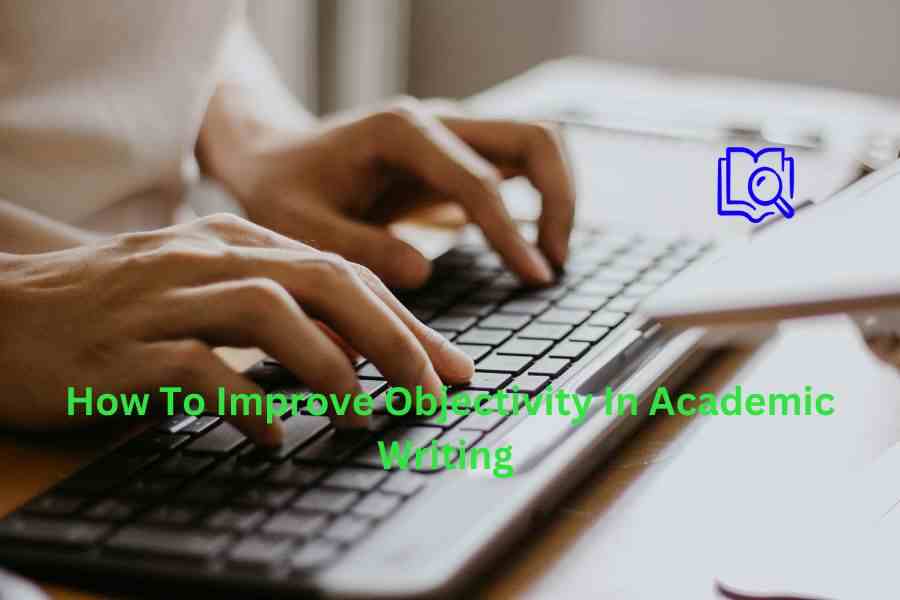Last updated on November 25th, 2025 at 12:57 pm
Objectivity is a critical feature of academic writing. It refers to the ability to present information, arguments, and conclusions without being influenced by personal bias or emotions.
In this article, I have suggested 18 strategies to improve objectivity in academic writing, ensuring a clear, professional, and balanced presentation of ideas.
Table of Contents
Understand the Role of Objectivity in Academic Writing
Understanding how to write objectively in research ensures that the arguments are presented based on facts and evidence, not on personal opinions or feelings.
This helps establish credibility, allowing readers to trust the accuracy and integrity of the work.
1. Use Neutral Language
Academic language plays a significant role in maintaining objectivity.
Avoid emotionally charged or subjective words, and stick to neutral, formal language that is appropriate for academic writing.
| Subjective Language | Objective Language |
|---|---|
| “I feel that this is wrong.” | “I feel that this is wrong.” |
| “I feel that this is wrong” | “This study provides valuable insights.” |
2. Present Evidence-Based Arguments
Back your claims with solid evidence, such as research studies, data, and citations from credible sources.
Avoid making assertions that cannot be substantiated with empirical evidence or established theory.
3. Avoid First-Person Pronouns
Academic writing typically favors third-person narration.
Avoid using first-person pronouns such as “I” or “we,” as they can introduce subjectivity. Instead, focus on the research, data, and analysis itself.
4. Critically Evaluate Sources
Ensure the sources you rely on are credible and unbiased. Peer-reviewed journals, academic books, respected databases, and search engines provide reliable data that contributes to an objective tone.
| Questionable Sources | Credible Sources |
|---|---|
| Personal blogs or forums | Peer-reviewed journal articles. |
| Unverified online opinions | Peer-reviewed journal articles. |
5. Separate Facts from Interpretation
It’s essential to differentiate between presenting facts and offering interpretation.
State the facts clearly, and only after providing a well-reasoned, evidence-based analysis should you offer interpretation or conclusions.
6. Improving research paper objectivity
To master academic writing skills, ensure that both sides of an argument are considered.
Presenting multiple viewpoints objectively demonstrates fairness and enhances the credibility of your analysis.
| Bias | Objectivity |
|---|---|
| “This argument is wrong.” | “This argument is debated by scholars, with evidence both for and against it.” |
7. Limit Personal biases
Self-awareness is key to maintaining objectivity.
Reflect on whether personal beliefs or opinions may unconsciously influence the content and make necessary adjustments to avoid bias.
8. Use Quantitative Data
Quantitative data adds to the objectivity by providing concrete evidence.
When possible, include statistics, figures, and numerical data that reinforce the neutrality of your analysis.
9. Proofread for Objectivity
Once you’ve written your paper, proofread it with a focus on identifying subjective language or assumptions.
Ensure that each statement is backed by evidence and that language remains formal and neutral.
10. Use Cautious Language
When making statements that are interpretations rather than definitive facts, use cautious language such as “may,” “could,” “possibly,” or “suggests.”
This prevents overgeneralization and maintains objectivity.
| Definitive Language | Cautious Language |
|---|---|
| “This proves that…” | “This suggests that…” |
| “It is clear that…” | “It may be the case that…” |
11. Avoid Overgeneralizations
Avoid making broad statements that cannot be substantiated by the evidence you present.
Be specific and stick to the scope of your research to maintain accuracy to maximize the importance and benefits of academic writing.
12. Engage in Peer Review
Peer review in research can help identify areas where objectivity may be lacking.
Constructive feedback can provide insights into how to improve neutrality and balance in your arguments.
13. Distinguish Between Opinion and Evidence
Make it clear when you are stating an opinion or when you are presenting evidence.
Although opinions are sometimes necessary, they should be presented as such and backed by supporting arguments or data.
14. Use Multiple Sources
By engaging with a range of sources, you avoid over-reliance on a single perspective.
This diversity in citations and references helps ensure that your work is comprehensive and balanced.
15. Be aware of confirmation biases.
Confirmation bias occurs when we seek out evidence that supports our preexisting beliefs while ignoring contrary evidence.
Stay conscious of this tendency and actively seek out differing viewpoints.
16. Remain Detached from the Subject Matter
While it’s normal to be passionate about a topic, remain detached in your writing.
Focus on presenting data and analysis rather than emotional investment in the outcome.
17. Avoid Stereotypes
Stereotypes can introduce biases into your writing.
Avoid generalizations about groups, cultures, or fields of study, and focus on the specific data relevant to your research.
18. Rely on Third-Party Perspectives
Citing other researchers’ conclusions and perspectives can enhance the objectivity of your work. Let the data and research speak for themselves.
FAQs
Why is objectivity important in academic writing?
Objectivity ensures that research is presented without bias, enhancing credibility and helping readers trust the information.
How can I avoid bias in academic writing?
Use neutral language, rely on evidence-based arguments, and avoid personal opinions or emotional language to minimize bias.
What is the difference between objective and subjective writing?
Objective writing focuses on facts and evidence, while subjective writing reflects personal opinions, feelings, or beliefs.
Conclusion: Maintain a Balanced Perspective
Objectivity is about balance and fairness.
By following the strategies outlined above, you can improve the objectivity of your academic writing, ensuring your arguments and research are clear, credible, and unbiased.




